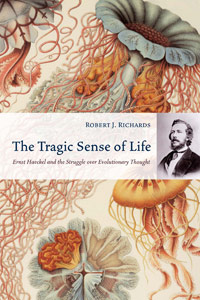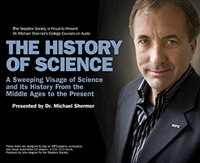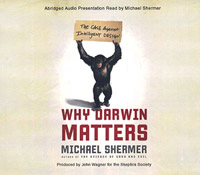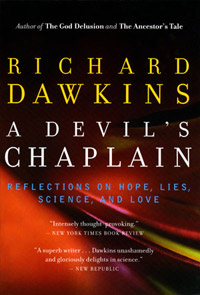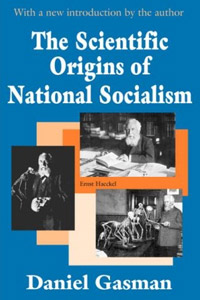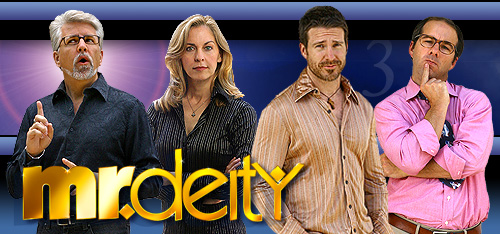
Season 3 of Mr. Deity is Here!
One of the most popular series of film shorts — Mr. Deity — is back for a third season starting June 8, featuring “Mr. Deity and the Virgin,” along with the trailer for the Larry/Deity (think Frost/Nixon) interviews, both of which are sensationally brilliant and damn funny. They’ve also relaunched mrdeity.com — the only place you can find all the Mr. Deity episodes (seasons 1 and 2) in one location.

lecture this Thursday…
The Evolution of God
with Robert Wright
SPECIAL DAY AND TIME:
Thurs., June 11, 2009 at 7:00 pm
Baxter Lecture Hall (map)
Don’t miss this lecture by the author of The Moral Animal: Why We Are the Way We Are and Nonzero: The Logic of Human Destiny. From the Stone Age to the Information Age, bestselling author Robert Wright unveils an astonishing discovery: there is a hidden pattern that the great monotheistic faiths have followed as they have evolved. Through the prisms of archaeology, theology, and evolutionary psychology, Wright’s findings overturn basic assumptions about Judaism, Christianity, and Islam, and are sure to cause controversy. READ more about this lecture >
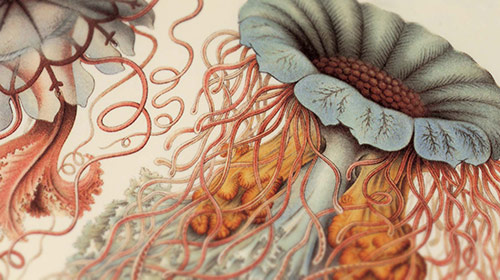
The Tragic Sense of Life (detail of cover)
From Haeckel to Hitler:
The Anatomy of a Controversy
by Daniel Gasman
In Ben Stein’s documentary film Expelled, the erstwhile game-show host and financial columnist attempted to link Darwin to Hitler and thereby condemn the scientific theory of evolution by association with the political theory of National Socialism. The film failed, fortunately, and was thoroughly panned by the critics. But in the cultural brouhaha stirred by the film’s release and subsequent disappearance from the big screen, not enough attention has been paid to whether or not there was a historical connection between the social Darwinists of the 19th century with the National Socialists of the 20th century. It turns out that there is, through the personage of the German biologist Ernst Haeckel; but a new biography of Haeckel, published shortly after Stein exited stage left, claims to rehabilitate Haeckel by disconnecting him from German social Darwinism, and thereby exonerating evolutionary theory. Unfortunately this new biography does no such thing, for in the end we must be true to the historical facts.
Robert J. Richard’s The Tragic Sense of Life: Ernst Haeckel and the Struggle Over Evolutionary Thought2 promises to rescue Haeckel from a century and a half of disparaging assessments of his biology, and above all undertakes a refutation of the more recent and widely held belief that he was instrumental in formulating the basic tenets of Nazi ideology. The common understanding among historians about the connection between Haeckel and Hitler is this: Adolf Hitler (b. 1889) came of age during the decade and a half following the publication in 1899 of Ernst Haeckel’s Riddle of the Universe, a runaway best seller that over the next two or three decades sold more copies internationally than the Bible and profoundly shaped the consciousness of the modern world. Haeckel’s book imparted a rigid Social Darwinist message purportedly derived from science: politics is applied biology, the Jews were an inferior race compared with the Aryans, Christianity was a religion of weakness, and that eugenic action was necessary to protect the racial composition of society.
Scholars who denigrate Haeckel compared to Darwin are “miscreant historians.”1
Richards’ biography attempts to disentangle Haeckel from Hitler. Haeckel, Richards argues in this elegantly written and technically innovative work, was really a benign political figure with affinities to liberalism rather than to Fascist authoritarianism, and an intellectual personality infinitely more interested in evolutionary science than in a radical, Nazi-like reorganization of society as is generally claimed. Racist eugenics, anti-Semitism, and extreme Germanic nationalism were really strains of thought foreign to Haeckel’s beliefs, and Richards claims that Haeckel has been falsely maligned — especially by me (in The Scientific Origins of National Socialism) and Stephen Jay Gould (in several of his popular essays and in his book, Ontogeny and Phylogeny) — as having a pernicious influence.3
These revisionist claims are intended to arouse considerable interest because if what Richards suggests is true, this would impact not only the history of science, but also a number of other important fields of history that have been linked to Haeckel in recent years: Nazism, anti-Semitism, the Holocaust, eugenics, and the role of science and political ideology. The problem, however, is that a careful reading of Richards’ book uncovers a narrative not of insight and innovative thought about an essentially fascinating scientist and dominant public figure, but a process of selective quoting and blatant manipulation of evidence to support the author’s thesis; the book turns out to be the creation of an author who seems to have an axe to grind and does not shrink from assertions that are clearly based on a slew of disquieting misrepresentations. This is a serious charge against a highly respected historian of science and Darwinian scholar who won the coveted Pfizer Award of the History of Science Society for his book Darwin and the Emergence of Evolutionary Theories of Mind and Behavior (University of Chicago Press, 1987), and one has to disentangle a number of separate strands of thought that run through Richards’ book in order to grasp how material is intentionally controlled so that more often than not only a fictionalized figure emerges, unrecognizable from what is commonly known about Haeckel and his science and philosophy.
For much of his academic career Richards has been on a self-declared mission impossible: to reconcile any perceived differences between Haeckel and Darwin and to establish that Darwin created his evolutionary theories from the same sources in German romanticism that determined Haeckel’s evolutionary science. Richards seems to have been motivated by the conviction that if Haeckel and Darwin can be shown to be theoretically indistinguishable then there is no foundation for assigning Haeckel a role as a progenitor of National Socialism. If Darwin was not a co-founder of National Socialism, then Haeckel, as the mirror image of Darwin, cannot also be burdened with such a grievous liability. Richards insists over and over again that “[Haeckel’s] theoretical convictions hardly differed from those of Darwin” and that German Darwinismus was interchangeable with the familiar patterns of English science.4
Haeckel did not have
a Tragic Sense of Life
Richards proposes as his main theme that Haeckel was guided by a tragic sense of life, bearing great similarities to the religious philosophy expounded by the famous Spanish writer and mystic, Miguel de Unamuno: “Unamuno offers a clue, I believe, for the solution of the puzzle of Haeckel…. Unamuno explored what he took to be the soul-splitting experience of Western intellectuals, their tragic sense of life. He depicted the struggles of a skeptical reason, especially in philosophy and science, as courageously insisting that human striving is mortal, that its efforts end in the grave; yet such reasoning, cannot, he thought, overcome the vital desire for life, for transcendence,”5 and that reason and life, therefore, are fundamentally at odds with each other. Richards thus proclaims that his “overarching argument will be that Haeckel’s science and his legacy for modern evolutionary theory display the features they do because of his tragic sense of life.”6
The trouble with this erudite exegesis — and Richards’ obvious failure to define exactly what transcendence might have actually signified for both writers — is the fact that Unamuno for the most part conceived his book as an attack on the scientific Monism of Haeckel, which he correctly understood to be the implacable enemy of Christian transcendence.7 In Unamuno’s Tragic Sense of Life — and this is not mentioned by Richards — Unamuno denounced Haeckel8 in the strongest language possible, and he decried Haeckel’s Monism as a faulty, unsatisfying, and materialistic philosophy because it denied the immortality of the soul: “Every monist system will always seem materialist,” hence deficient, Unamuno declared. Rather, “only dualist systems preserve the immortality of the soul, only those systems which teach that human consciousness is something substantially distinct and different from other manifestations of phenomena.”9 Therefore, “monist tricks are of no use to us. We want the substance, not the shadow of eternity!”10 It is anybody’s guess how this explanation by Unamuno of the dualistic meaning of transcendence, his anguished evocation of the tragic sense of life, and his unconditional rejection of scientific Monism and pantheism, can be reconciled with Richards’ flights of imagination about Haeckel’s philosophical links to Unamuno as well as Richards’ invalid account of Haeckel’s supposed quest for transcendence that runs parallel to the religious devotion of the Spanish philosopher.
The truth of the matter is that Richards seems uncomprehending of the central ideas contained in Unamuno’s remarkable philosophical essay. Impressed by the cultural impact of the Darwinian revolution and modern science in general, Unamuno was concerned about the loss of meaning in life and the undermining of the traditional religious source of faith and ethics brought on by the triumph of Positivism in the 19th century. As a religious thinker, Unamuno suggested that ultimately, human life could only be sustained by irrational Christian faith. For Unamuno it was the tragedy occasioned by the contradiction between the impersonal findings of science and its candid recognition and acceptance of death, on the one hand, and, on the other hand, the human need for concrete physical immortality, and for a transcendent humanistic faith and adherence to ethical values that of necessity had to be sustained devoid of scientific and rational authority — an unresolved dilemma that fuels the tragic sense of life confronting modern man as Unamuno describes it.
But for Haeckel, despite what Richards importunes, no such contradictory tragedy exists for modern man. Haeckel embraced death and the meaninglessness of human existence and rejected any belief in transcendent faith. Death in the Christian sense that Unamuno believed in was not to be defeated by spiritual transcendence, but was rather to be embraced as the evolutionary source of new life. For Haeckel, awareness of death was not a tragedy, but only a necessary part of the struggle for existence and evolution, that death begets life. Despite what Richards contends, therefore, Haeckel’s position on transcendence and his rejection of all its forms, was the remote antithesis of what Unamuno believed and validated in his classic text.
item of interest…
Shermer’s college course on the history of science provides a sweeping look at science, its history and philosophy from the Middle Ages to the present, with special emphasis on defining science within the cultural context of the age, who was doing science at the time, and what their goals were in conducting science. Includes lectures on Darwin and social Darwinism.
ORDER the MP3 CD
Furthermore Haeckel, despite what Richards urges, did not believe, with Unamuno, that reason is the enemy of life, nor could Haeckel have accepted Christian-like transcendence because his Monism was totally committed to a philosophy of immanence. Such contradictions inevitably weigh heavily on the truth and present insurmountable intellectual problems for the reader, but Richards’ analysis bears no relation to the Monism of Haeckel, nor does seem to fully understand the thought of Unamuno.11
Furthermore, one should bear in mind that a tragic sense of life implies some aspect of non-fulfillment; that, for example, the attainment of absolute knowledge is forever limited and therefore human beings can never realize certainty in life, especially over questions of morality and the tragedy of human mortality. In other words, Monism is the opposite of a tragic sense of life, because Monism implies total fulfillment based on the absolute reconciliation of opposites. For Haeckel, therefore, the utopian ideal of total fulfillment was possible and he would have rejected as foreign, Unamuno’s concerns. In Haeckel’s 1899 magnum opus, The Riddle of the Universe, the theme clearly advanced was that knowledge was not limited. On the contrary, for Haeckel, all the riddles of the universe had been or were on their way to being solved. Nothing lay beyond the ability of science to comprehend the complete structure of the cosmos. Thus, the aspect of tragedy that Richards assumes in Haeckel is simply not there. In Richards’ analysis, therefore, style endlessly overwhelms substance and the thinking of Haeckel is continually masked in order to obscure its intrinsically anti-humanistic content.
Haeckel & Darwin are not Identical
A critical theme in Richards’ book emphasizes that the distinctions that are conventionally drawn between the science and biology of Darwin and Haeckel are misplaced and that the two scientists are really interchangeable intellectual figures. Richards believes that when correctly analyzed, Darwin is actually a Haeckelian and that his biology draws upon the same sources and closely resembles the science of Haeckel. However, even if one were to admit that there were some common romantic sources in the scientific theories of Darwin (and this is probably not the case), there remain vast theoretical, cultural, and political differences between the two men and Richards’ suppositions appear to be hypotheses unsupported by the available evidence.
As has been frequently observed, Haeckel’s biology assumed the reality of determining forces within nature, a position remote from Darwin’s theory of natural selection.12 Furthermore, it should be borne in mind that Darwin did not offer a comprehensive philosophy of life, as Haeckel did. As early as the writing of the Generelle Morphologie in 1866, Haeckel presented his evolutionary theory combined with his philosophy of Monism, suggesting that evolution was not just a theory about the development of life and the creation of new species, but a total explanation of the meaning of life. This was very different from what Darwin offered in the Origin of Species, which was simply an explanation for evolution. Monism dominated Haeckel’s science and philosophy for the rest of his life, but disturbingly, Richards takes great pains to gloss over this fact as much as possible, uncritically integrating Haeckel’s religious ideas into his science. This allows Richards to portray Haeckel as virtually the same as Darwin and therefore not culpable of having developed a mystical philosophy that would dominate not only his science, but also his Germanic nationalism and proto-Fascism.
In all other major areas as well, a vast chasm separates the two men. Darwin did not suggest that spontaneous generation had been empirically verified, like Haeckel did. Darwin did not proselytize on behalf of an evolutionary religion that would replace Christianity, nor did Darwin believe in the existence of a world soul, or in pan-psychism, or suggest a predilection for magic or theosophy, all of which Haeckel did. Darwin did not articulate a comprehensive plan of racial eugenics for the regeneration of society, nor was Darwin an anti-Semite, believing that the biblical tradition was at the root of the weakness of European civilization; nor was Darwin an opponent of liberalism. Haeckel was absolutely insistent in his support of the existence of the Aryan race and he explicitly lent his scientific authority to the racial-historical theories of Count Gobineau, hardly a view of the world to which Darwin would have subscribed. Darwin was an abolitionist,13 but Haeckel believed in the intrinsic inferiority of the African peoples and used highly charged derogatory racial-infused language about Africans that would have been abhorrent to Darwin. The obvious reality is that Haeckel’s Darwinism represents an intellectual and ideological universe totally apart from that of Charles Darwin. Any attempt on the part of Richards to draw parallels between English and German Darwinism represents a distortion that journeys way beyond the parameters of plausible historical evidence and analysis.
In stirring language, Richards glorifies the romantic strain in both Haeckel and Darwin, as if to say that this mode of thought was scientifically and philosophically fruitful. But, as is generally conceded, Haeckel’s science ultimately collapsed by the end of the 19th century, and that the real weaknesses of Haeckel’s biology resided in the fact that he borrowed too heavily from the tradition of German romanticism. In emphasizing this interpretation of 19th century evolutionary history, Richards, therefore, presents historians of science with a serious analytical conundrum: if Haeckel’s science was in fact shaped by romanticism and ultimately failed as a consequence, what is the point of idolizing such a methodological approach to investigating the structure of the organic world? And was it, in the end, not the resemblance of the two men, but rather Haeckel’s over reliance on romanticism that clearly distinguished his science from the non-romantic science of Darwin?
item of interest…
Historian of science, Michael Shermer, defuses the fears that cause people to reject the theory of evolution by examining what evolution really is, how we know it happened, and how to test it.
ORDER the CD
Haeckel Inspired “Scientific” Secular Anti-Semitism
Richards insists that Haeckel has been misrepresented as an anti-Semite, and that in fact Haeckel stood out during his time as someone who had befriended the Jewish community in Germany. However, Richards is able to arrive at his denial of “Haeckel’s alleged anti-Semitism” by an egregious manipulation of evidence, including indiscriminate omission of incriminating material and by offering what can only be described as fantastical interpretations of passages from Haeckel’s writings dealing with the Jews.
Richards repeats the litany that Haeckel has been falsely accused of hostility to the Jews — “the tendentious charge of anti-Semitism by Gasman….’14 But this claim demonstrates a disturbing lack of knowledge about German history and the history of modern anti-Semitism, because it leaves out the emerging school of “scientific” secular anti-Semitism that Haeckel belonged to and was one of the founding fathers and a guiding light. He does not understand that so-called “scientific” anti-Semitism was much more lethal and prophetic of National Socialist ideology than purely religious traditional antagonism against the Jews. In my book, Haeckel’s Monism and the Birth of Fascist Ideology (1998, 2008) the discussion of the Monist writings of the important French proto-Nazi authors Jules Soury and Georges Vacher de Lapouge — both translators into French of some of Haeckel’s major writings and close disciples of Haeckel — make clear that the ideological foundations of National Socialist anti-Semitism can be directly traced back to the specific influence of Haeckel. Of course, Richards does not mention any of this material, because he is determined to sanitize his book and omit any historical sources that might undermine his fallacious arguments that seek to deny Haeckel’s antagonism towards the Jews and connections with National Socialist ideology in general.
In his remarks in 1894 to the literary critic Hermann Bahr in an interview on the Jewish question,15 Haeckel declared the “Jewish Problem” to be a “racial question,” extolled anti-Semitism as a politically creative force, justified its historical role and held the Jews alone responsible for its appearance, and he demanded that the Jews give up their religious identity and disappear from German life as a separate community — hardly examples of statements Richards believes he has found that prove Haeckel’s philo-Semitism.16
On a number of separate occasions I have urged Richards to take into consideration the entire text of the Hermann Bahr interview with Haeckel on his attitude towards the Jews, but to no avail; he continues to justify using only a tiny portion of the interview for his analysis and taking the passages selected out of context, in this way continuing to misrepresent Haeckel’s position about the Jews.16
Richards’ “Moral Grammar” as Moral Hazard
Richards concludes his book with the reprinting of an essay: “The Moral Grammar of Narratives in the History of Biology — the Case of Haeckel and Nazi Biology.” This essay was originally delivered a few years ago (Ryerson Lecture, April 12, 2005) at the University of Chicago. It now makes its reappearance in this forum and Richards attaches great importance to it, believing it to provide a foundation for his belief that the connection between Haeckel and National Socialism is a hypothesis that stems from manipulated historical sources, and not at all a reflection of historical reality in the decades around the turn of the 20th century. Haeckel, he argues, has to be evaluated not in absolute moral terms, but in regard to the ethical context of his own times.
However, Richards is unable to show that moral consciousness was substantially different a little over a century ago in Germany, a country situated at the very heart of European civilization; there were no fundamentally different moral standards in operation at the time that could be taken to be essentially at odds with our own values. Richards unjustifiably confuses remote historical times with the contemporary world that certainly would include the late 19th and early 20th century, the period when Haeckel was politically and scientifically active.
In this essay Richards undertakes a historiographical excursion that challenges the sensibilities of even hardened readers, decrying the writing of history in general as an exercise in manipulation as far back as Herodotus and Thucydides, and eventually ending up with a denunciation of historians like myself who, by linking Haeckel with National Socialism, have “caus[ed] sputtering convulsions,”17 because of a deceptive narrative of historical causality.
item of interest…
Diverse topics examined through the lens of natural selection: education, ape rights, jury trials, the vindication of Darwinism; memes; religion, academic obscurantism; Stephen Jay Gould; Douglas Adams; pseudoscience; and his awe at the marvelous complexity of the universe. ORDER the book
What Richards overlooks is that Haeckel and his followers had a lot to say about ethics and morality. They were not passive onlookers at the society in which they lived, as Richards seems to suggest, but they constantly talked and wrote about the need to break down conventional religious standards in the light of the discoveries of evolutionary science. The Monists celebrated the defeat of Judeo-Christian ethics in the name of the struggle for existence and the demands of evolution, a discussion that would figure so poignantly in the writings of Nietzsche and the cultural tragedy he felt coming with the death of God. By neglecting to point this out, Richards succeeds in casting Haeckel and the Monists in ahistorical terms as purveyors of conventional morality. Haeckel, however, was constantly at war with the traditional beliefs of European civilization, hoping to revolutionize the very ethical basis of society, and this represents a disturbing moral reality that does not enter into any of Richards’ calculations about the need for the historian to evaluate individuals in terms of their own society.18
Richards accuses historians who criticize Haeckel of distorting evidence by cutting quotations. Of course no examples are provided by Richards.19 This is an unfounded accusation because it is Richards himself who is doing all the “cutting” of relevant sources. Richards, for example, earlier in his text, discusses a book that Haeckel wrote during the First World War, Eternity, where all the National Socialist like statements are excised by Richards and Haeckel is misleadingly presented as simply a tragic world weary figure, a detached victim of the war and not a bitter politically motivated extreme nationalist lamenting the defeat of the German Empire and fuming about the racial catastrophe occasioned by the introduction of African and Asian troops onto the continent of Europe by the Allied armies.20 Omitted by Richards are racial warnings raised by Haeckel: “Deep students of ethnology and far-sighted statesmen point with anxiety to the grave consequences that are sure to follow this ‘fraternalization’ of all the races both to England herself and the supremacy of the white race as a whole.” The Allies were tragically oblivious to the fact that the “cultural and psychological differences that separate the highest developed European peoples from the lowest savages are greater than the differences that separate the savages from the anthropoid apes.”21 After the armistice in November 1918, Haeckel, obsessed with racial concerns and reflecting a long tradition in Monist eugenics about the threat to Europe posed by the exponential growth of the populations of the East, complained in a letter written to a soldier at the front that he “feared that the greatly longed for peace will result in a full reversal of modern culture. Our laughing heirs will apparently be the yellow Mongolians.”22
Richards rejects my evaluation (along with that of other historians) of Haeckel and the Nazis, because he claims we advance a “mono-causal” theory. “I have objected,” Richard writes, “to the ways in which these historians have attempted to link Haeckel with the rise of the Nazis and the actions of Hitler in particular. They have not, for instance, properly weighed the significance of the main other causal lines that led to the doctrines of National Socialism — the social, political, cultural, and psychological strands that many other historians have emphasized.”23
But this criticism of Richards is invalid and is advanced to deflect attention away from Haeckel’s Nazism. It is not that there has been a failure to take into consideration additional contributing factors in the rise of National Socialism, but rather that the more conventional explanations of the past have, on the whole, not been successful and have fallen frequently by the wayside after the discovery of new information. The explanations for the rise of National Socialism and Fascism apart from emphasis on Haeckel have had a tendency to break down and this has occurred many times. On the other hand, the connection of Haeckel, National Socialism, and Monist Science continually yields more meaningful theoretical results and this approach is confirmed by the latest scholarly research.24
item of interest…
Many studies of the origin of National Socialism claim that the völkisch and proto-Nazi movement arose largely as a reaction to the materialistic ideas of nineteenth-century science and especially to the naturalistic philosophy of Ernst Haeckel and the German Monist League. Using hitherto unexplored material, Daniel Gasman calls this generalization into question. Arguing that the importance of science has been relatively neglected in accounts of the intellectual origins of Nazism, he attempts to show that Haeckel’s “scientific” Darwinism, and his movement, the German Monist League, were proto-Nazi in character. ORDER the book from Amazon
In the very last paragraph of his book Richards reveals how little he grasps about the connection between Haeckel and Nazism. Richards suggests that in the end the Nazis borrowed just a few lines from the eugenic literature of Monism and nothing more; and that, in fact, Haeckel was completely rejected by the Nazis.25 In other words, the substance of Nazism has nothing to do with Haeckel’s Monist program. Such statements bear no relation to a much more complex and contrasting historical truth about the very real connection between Haeckel and Hitler.
References
- ^ Richards’ comment appears on the book jacket of Sander Gliboff, H.G. Bronn, Ernst Haeckel, and the Origins of German Darwinism, Cambridge, Mass.: MIT Press, 2008. In an enthusiastic review of Richards’ biography of Haeckel, Professor Gliboff reinforces all the errors that appear in Richards’ book. Scientific American, Vol. 97 (1), January–February2009, 68.
- ^ Robert J. Richards, The Tragic Sense of Life: Ernst Haeckel and the Struggle Over Evolutionary Thought, Chicago: University of Chicago Press, 2008.
- ^ Ibid, 449.
- ^ “Darwin [can] be accounted a Haeckelian;” Richards, Tragic Sense of Life, 72. Or as Richards writes further on: “The history I have sketched … indicates that Haeckel not only drew on many of the same sources that formed Darwin’s own conceptions, but more importantly, that beneath the distinctively Germanic outer layers, the core of his evolutionary morphology was the same as the Englishman’s;” 119, n.15.
- ^ Richards, Tragic Sense of Life, 10, n.31.
- ^ Ibid, 16.
- ^ Unamuno published his book early in the 20th century, at a time when Haeckel’s Monism had achieved overwhelming prestige symbolized by the famous International Monist Conference held in Hamburg in 1911.
- ^ Unamuno was hardly complimentary towards Haeckel: “There is no point in talking of the indecencies of Haeckel, that master of incomprehension;” “[Haeckel] harbor[s] the pretension of disdaining theology” and “has succeeded [only] in dissipating the enigmas of nature.” Unamuno, Tragic Sense of Life, Princeton: PUP, 1972, 106, 258.
- ^ Ibid, 89–90.
- ^ Ibid, 53.
- ^ Richards incorrectly transforms Unamuno into a pantheist in order to show his affinity with Haeckel: “Unamuno argued that the desire for immortality, the longing to unite with eternal, divine nature….” Richards, Tragic Sense of Life, 453. But Richards’ explanation is absolutely untenable and demonstrates how the primary theory of his book is built on a foundation of sand. Immortality for Unamuno was conceived in a Catholic sense, meaning a hoped for immortality of the concrete, physical person. As Unamuno wrote in opposition to Monism: “No, I do not long to be submerged in the great All, in infinite and eternal Matter or Energy, or in God. I long to possess God, not to be possessed by Him, to become myself God without ceasing to be the I who now speaks to you.” Unamuno, Tragic Sense of Life, 52–53. On Unamuno’s interest in but ultimate rejection of pantheism, see Armand F. Baker, “The God of Miguel de Unamuno,” Hispania, 74(3) December 1991, 824–833.
- ^ See Jacques Roger, “Darwin, Haeckel et les français,” in Yvette Conry (ed.), De Darwin au Darwinisme, Paris: Vrin, 1983, 149–165.
- ^ See Adrian Desmond & James Moore, Darwin’s Sacred Cause: How a Hatred of Slavery Shaped Darwin’s Views on Human Evolution, Boston: Houghton Mifflin, 2009. For Haeckel’s derogatory views about the “inferiority” of Africans, see for example, Ernst Haeckel, Eternity: World War Thoughts on Life and Death, Religion, and the Theory of Evolution, New York: Truth Seeker, 1915, 166.
- ^ Richards, Tragic Sense of Life, 273.
- ^ See “Rejoinder Three” for a discussion of the Bahr Interview with Haeckel about the Jews: Internet Posting; Ferris.edu/ISAR/Gasman Controversy
- ^ See my three ‘Rejoinders’ to Richards mentioned above and posted on the Internet that directly challenge Richards’ interpretation of the Bahr Interview.
- ^ Richards, Tragic Sense of Life, 506.
- ^ Ibid.
- ^ Ibid, 500.
- ^ Haeckel, Eternity, 166 and passim.
- ^ Ibid, 107.
- ^ Quoted in Daniel Gasman, The Scientific Origins of National Socialism, New Brunswick: Transaction Press, 2004, 25.
- ^ Richards, Tragic Sense of Life, 507–508.
- ^ Though it would have appeared too late for Richards to have cited it, the catalogue for the remarkable exhibition last summer [2008] at the Montreal Museum of Fine Arts demonstrated the critical role that Haeckel and Monism played in the elaboration of 20th century totalitarian art. Following Richards’ summary of the thought of Haeckel, such an exhibition must be inconceivable. See Jean Clair (ed.), The 1930s: The Making of the “New Man,” Ottawa: National Gallery of Canada, 2008.
- ^ Richards, Tragic Sense of Life, 453: “Yet Haeckel, I believe, would have rejected the vulgar and dogma-driven Nazis, just as they rejected him.” But many Nazis especially in the scientific and SS community, did not reject Haeckel, but instead enthusiastically embraced his racial and eugenic ideas and programs.

Evolutionary Economics
Although the Skeptics Society is apolitical, Michael Shermer sometimes explores political and economic issues in his blog posts. In this week’s SkepticBlog, Michael Shermer attends the Cato Institute conference on evolution and economics and weighs in on what was presented and discussed.
READ the post and comment on it at Skepticblog.org >
While you’re there be sure to read the blog posts of the other Skepticbloggers: Brian Dunning, Kirsten Sanford, Mark Edward, Phil Plait, Ryan Johnson, Steven Novella, and Yau-Man Chan.


